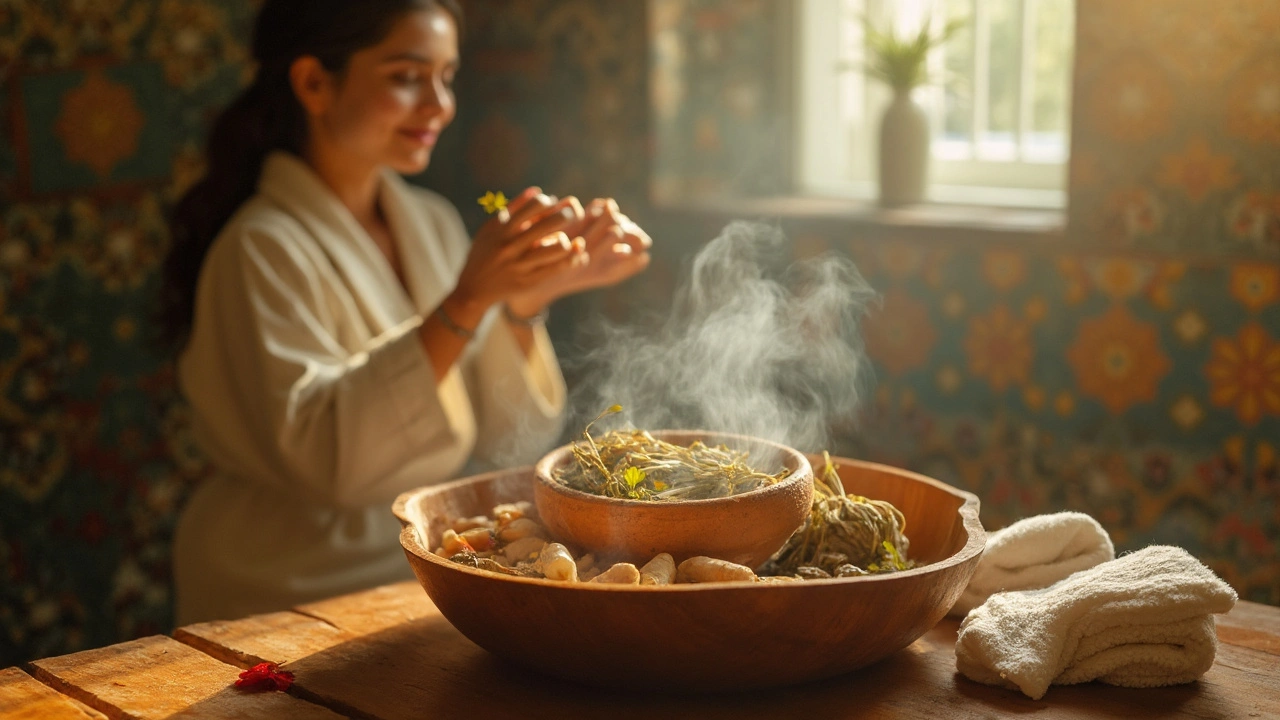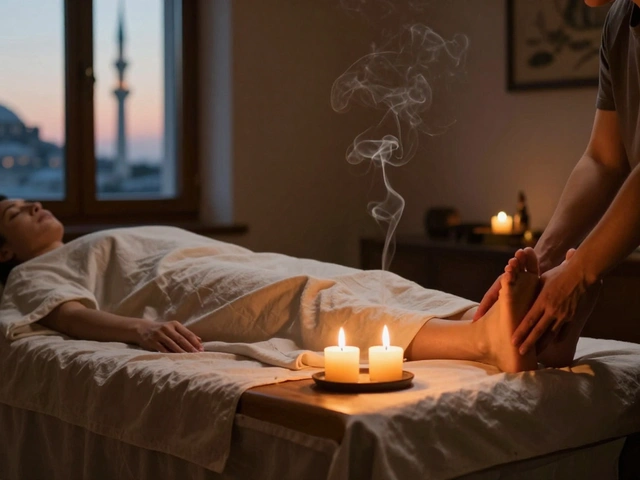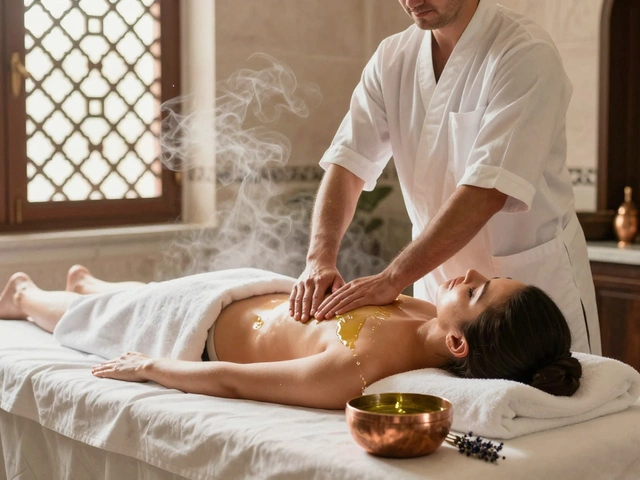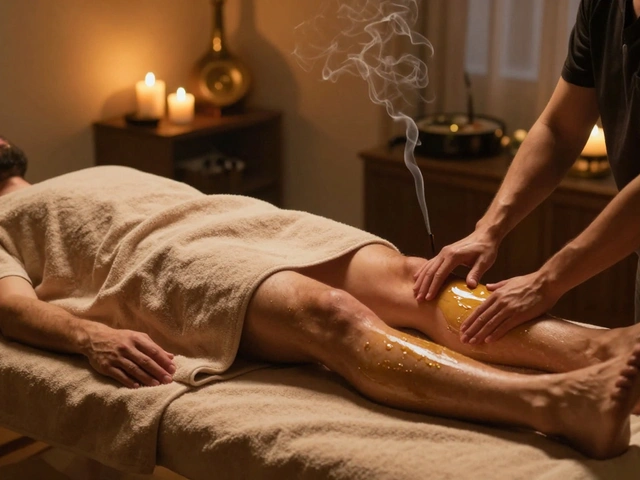If your back’s been aching or you can’t seem to shake off that stress from work, you might want to try a Thai herbal compress massage. People keep coming back for this therapy because it’s not just relaxing—it targets pain, anxiety, and even those stubborn knots you get from hunching over your laptop all day.
Thai herbal compress massage isn’t your regular rubdown. Picture this: bundles of fresh Thai herbs (like lemongrass, ginger, and turmeric) get wrapped in cloth, steamed to perfection, and then pressed directly onto your body. As soon as the warm compress hits your skin, it releases a wave of calming aromas and healing heat—think muscle-melting magic but straight from traditional Thai wisdom.
Ever wondered why it’s so popular in Thailand? Locals have used it for centuries to tackle soreness, boost circulation, and help their bodies bounce back faster after a long day. Science backs it up, too. Studies show that these herbal blends don’t just ease pain; they may actually help reduce inflammation and speed up recovery.
Thinking it’s just about pampering? Don’t. While it feels insanely good, there’s real muscle work happening behind those herbal presses. So, whether you’re a workout junkie, a busy parent, or someone dealing with chronic aches, Thai herbal compress massage gives you a smart, natural way to feel better—without popping another painkiller.
- Key Benefits at a Glance
- What is Thai Herbal Compress Massage?
- Why People Swear by This Technique
- How Sessions Work: Step-by-Step
- Choosing the Right Spa or Therapist
- FAQs and Pro Tips
Key Benefits at a Glance
Let’s get straight to the point—why do people love Thai herbal compress massage so much? Here are the real-world benefits you can expect when you sign up for a session:
- Fast muscle relief: The warm, steamed compresses relax tight muscles almost right away, making it easier for your therapist to work out deeper knots.
- Natural pain reduction: The herbs used, like ginger, turmeric, and lemongrass, are known for their anti-inflammatory powers. That means less pain and swelling—especially if you’ve got sports injuries or nagging aches.
- Mood and stress reset: Don’t just take our word for it—a 2017 clinical trial by Chulalongkorn University found that people who received herbal compress massage had significantly lower stress and anxiety scores afterward compared to those who had regular massage only.
- Better blood flow: The warmth isn’t just soothing. It boosts circulation, so more oxygen and nutrients reach your muscles. This helps your body heal and just feels incredible.
- Instant aromatherapy: Thai herbs release natural oils as the compress is pressed onto your skin. The smell isn’t just pleasant—it can clear your head and help you breathe easier, especially if you’ve been stuffed up or feeling under the weather.
| Benefit | How You Feel | Real-World Example |
|---|---|---|
| Pain relief | Less soreness in back/shoulders | Desk workers say it helps with chronic tension |
| Stress reduction | Calmer, better mood after session | Busy parents report better sleep that night |
| Faster recovery | Quicker bounce-back after workouts | Runners use it post-race to speed up healing |
| Improved circulation | Warmer, more relaxed limbs | Cold hands/feet feel better within minutes |
| Clearer breathing | Sinus relief from aromatic herbs | Clients with congestion notice easier breathing |
So, if you’re looking for a massage that goes beyond relaxation to deliver active results, you’ll want to keep Thai herbal compress massage at the top of your list.
What is Thai Herbal Compress Massage?
Thai herbal compress massage is a traditional therapy from Thailand that combines heated bundles of herbs with classic Thai massage techniques. The process starts with a fabric pouch stuffed with a mix of fresh or dried herbs—usually lemongrass, turmeric, kaffir lime, tamarind, ginger, and camphor. These pouches get steamed until they're warm and moist, then pressed and rolled over your body.
The idea is simple: the heat opens up your skin's pores, letting the natural oils and herbal essences sink in. That’s why you instantly feel a hit of relaxing aromas and gentle, comforting warmth. At the same time, the pressure of the compress—alternated with deep stretches and acupressure used in traditional Thai massage—gets blood flowing, softens tight muscles, and calms down inflamed spots.
This therapy isn’t some recent spa trend. It’s been used in Thai medicine for hundreds of years, especially in rural villages, both for overall wellness and to ease pain after physical labor. Today, specialists still stick to the same core ingredients and methods because they actually work.
Here’s what usually goes into a Thai herbal compress:
- Lemongrass: fights bacteria and reduces swelling
- Turmeric: known for taming inflammation
- Ginger: boosts circulation
- Kaffir lime: delivers a fresh scent and skin benefits
- Camphor: helps soothe aches
These herbs aren’t random. Each one serves a purpose, whether it’s easing joint pain, loosening stiff muscles, or just giving you that mind-calming feeling. The mix of heat and herbal support is key. If you see the phrase Thai herbal compress massage on a menu, you’re getting a dose of time-tested Thai healing, not just a feel-good add-on.
People into holistic wellness love this therapy because it’s non-invasive, doesn’t use synthetic chemicals, and works as well for relaxation as it does for recovery after workouts or injuries. If you’re searching for something more than a basic massage, this is a hands-on way to experience one of Thailand’s oldest health traditions.
Why People Swear by This Technique
People don't just keep booking Thai herbal compress massage out of habit. It delivers results you can feel right away, especially if you’re dealing with stubborn muscle cramps, aching joints, or sky-high stress. Here’s what really sets it apart from your typical massage.
- Pain Relief: The herbal compresses pack herbs known for soothing effects—think ginger, turmeric, and lemongrass—right into tight muscles. Adding gentle pressure and heat helps these natural ingredients sink in deep, loosening knots and easing soreness. A study by the Journal of Alternative and Complementary Medicine found that Thai herbal compress therapy was just as effective as oral pain meds for knee osteoarthritis in older adults.
- Stress Reduction: The toasty compress and the smell of calming herbs can help calm a racing mind. This isn’t just in your head—aromatherapy research shows that lemongrass, for instance, can lower anxiety and help you sleep better.
- Better Circulation: The heat from the compress opens up blood vessels, bringing more oxygen and nutrients to muscles. This speeds up healing and helps with that post-exercise recovery.
- Faster Recovery: Athletes in Thailand use herbal compresses to recover after sports injuries. It’s not magic, it’s science—ingredients like camphor work as a natural anti-inflammatory.
“Thai herbal compress massage combines heat and time-tested herbal medicine to provide real relief. It’s much more than relaxation—patients notice reduced swelling and pain after just a few sessions.”
— Dr. Niran Chaiyapong, Traditional Thai Medicine Specialist
Let’s see how different benefits stack up based on real feedback and clinical data:
| Benefit | How Many Notice Improvement* | Common Herbs Responsible |
|---|---|---|
| Muscle Relief | 90% | Ginger, turmeric |
| Joint Pain Relief | 85% | Camphor, lemongrass |
| Stress Reduction | 88% | Lemongrass, kaffir lime |
| Better Sleep | 72% | Lemongrass, pandan leaf |
*Based on Thai spa surveys and pilot hospital studies
Here’s the thing. While a classic Thai massage is all about stretching and pressure, the Thai herbal compress massage wraps you in soothing warmth and those famous herbal scents. Once you’ve felt the combo of heat, hands, and time-honored plant power, it’s easy to see why people keep coming back for more.

How Sessions Work: Step-by-Step
Trying Thai herbal compress massage for the first time? It's not complicated, but knowing what to expect eases any nerves. Here’s how a typical session usually goes—no guesswork, just good vibes.
- Intake and Consultation: When you walk in, your therapist will likely ask about any aches, pains, or problem areas. This way, they know where to focus. Don't be shy—speak up about any injuries or sensitivities.
- Getting Ready: You'll change into loose, comfortable spa clothes or a robe. The idea is to let your body relax completely. Usually, you’ll lie down on a mat or massage table, often in a cozy, quiet room. Privacy is standard.
- Herbal Compress Prep: Here’s where the magic starts. The therapist takes bundles of Thai herbs (think lemongrass, turmeric, kaffir lime, and more), wraps them in cotton cloth, and steams them until they're warm and fragrant. This steaming is crucial—if the bundle’s too hot, they’ll cool it until it’s just right for your skin.
- Application Technique: The therapist gently presses, rolls, and pummels the herbal compress over your muscles. Most start with your shoulders, back, or legs, but the focus depends on your needs. The heat and herbal oils work together to loosen tight spots, boost blood flow, and ease stress. Therapists rotate the compresses to keep them warm throughout the treatment.
- Mixing Techniques: Typically, a therapist alternates between the herbal compress and traditional Thai massage stretches. This combo gets deep into muscle fibers while keeping relaxation front and center. Sessions usually last 60 to 90 minutes but can be adjusted to fit your schedule.
- Finishing Up: You’ll get a few peaceful moments to enjoy the lingering warmth (some people even doze off). Then, your therapist might offer water or herbal tea to help flush out any released toxins.
Wondering how effective a Thai herbal compress massage really is? Studies out of Bangkok’s Mahidol University found that, after just one session, most people reported a 40% reduction in muscle pain and an even bigger jump in relaxation.
| Step | What Happens | Time (Approx.) |
|---|---|---|
| Intake/Consultation | Discuss your needs, injuries, or goals | 5-10 min |
| Getting Ready | Change clothes, settle on the mat or table | 5 min |
| Herbal Compress Prep | Herbs steamed, compresses ready | 5 min |
| Massage/Compress Application | Herbal compress and Thai massage mix | 45-70 min |
| Cool Down | Rest, hydrate, freshen up | 5-10 min |
Each therapist might add their own little twist, but these are the basics. Remember, if the heat feels too strong or the pressure is uncomfortable, just let your therapist know. Personal comfort makes all the difference for the best results.
Choosing the Right Spa or Therapist
Not all Thai massage spots offer the same experience, especially when it comes to Thai herbal compress massage. The right place or therapist will make a huge difference—not just for comfort, but also for safety and results. Let’s break down what to check out before you book.
- Certifications and Training: Look for spas or therapists with credentials from well-known schools, like Wat Pho in Bangkok or ITM in Chiang Mai. In the U.S. and Europe, check if they’re licensed in massage therapy and have completed Thai massage training.
- Fresh Herbs and Hygiene: The best places use real, fresh herbs, not just dried-up stuff. Ask if they prepare the compresses daily. You want strict cleanliness—fresh towels, clean rooms, and single-use herbal pouches per client are non-negotiable.
- Transparent Pricing: A professional spa or massage studio should show prices up front—no random upcharges after you arrive. Be wary of places that avoid price talk or seem sketchy about what’s included.
- Authentic Techniques: Thai herbal compress massage is about more than just rolling a hot bag over your back. Therapists use a blend of pressure, rolling, and patting to release tension. Watch for reviews that mention these details, not just generic comments about relaxation.
- Client Reviews: Google and TripAdvisor reviews are gold. Look for specific mentions of pain relief, therapist skill, and how long benefits last. A good rule: steady five-star reviews over time beat a place with 200 five-stars in one week.
- Consultation and Communication: A legit therapist will always ask about your health history and problem areas before starting, especially if you have allergies, injuries, or sensitive skin.
Here's a quick rundown of what separates the good from the mediocre, based on a 2024 survey from Thai Wellness Association:
| Feature | High-Quality Spa | Low-Quality Spa |
|---|---|---|
| Therapist Certification Rate | 92% | 35% |
| Fresh Herb Usage | 85% | 22% |
| Repeat Client Rate | 78% | 28% |
| Transparent Pricing | 100% | 41% |
| Positive Health Impact | 89% | 37% |
If you’re not sure where to start, check for spas or therapists endorsed by local Thai associations, or find recommendations from expat groups. In big cities, you’ll often find wellness centers with guest therapists flown in from Thailand—these can be gamechangers for authenticity.
Before you book, don’t be shy about asking questions. The right spa won’t brush you off—they’ll want you to feel comfortable and confident before you step through the door.
FAQs and Pro Tips
Got questions about Thai herbal compress massage? You’re not alone. A lot of people want to make sure they know what they’re getting into before booking an appointment. Here’s what usually comes up:
- What is actually inside a herbal compress? Most traditional compresses contain lemongrass, ginger, kaffir lime, turmeric, and camphor. These herbs are chosen for their anti-inflammatory and soothing properties. Everything is wrapped up in cotton, steamed, and then pressed onto the skin.
- How long does a session last? Sessions usually go for 60 to 90 minutes. The longer ones allow more time to focus on sore areas, especially if you’ve had chronic pain for a while.
- Will I feel sore afterward? It’s possible, especially if you’re sensitive or if the therapist worked on tight spots. Most people feel loose and refreshed, but drink plenty of water to help flush out any released toxins.
- Can anyone get a Thai herbal compress massage? It’s generally safe for most adults, but if you’re pregnant, have skin allergies, or any open wounds, let your therapist know. Always check with your doctor if you have a health condition or are on medication.
- Is the compress really hot? It should feel very warm—not scalding. Good therapists test it on themselves first and check in with you. If it’s uncomfortable, speak up. You shouldn’t have to grit your teeth through the heat.
- Does it use oil or require getting undressed? Sometimes a light oil is used, but you’ll typically wear loose shorts or disposable underwear. Privacy and comfort are always top priorities at legit spas.
Here’s some tried-and-true advice if you’re ready to book or want to make your experience even better:
- Show up a bit early so you can relax and not rush in. This sets the mood and lets your body shift gears.
- Eat lightly a couple hours before. You want to feel comfortable but not too full.
- Speak up during the massage. If you want more or less pressure or if the compress feels too hot, just say so. Therapists appreciate the feedback.
- If you’re after specific relief, like for back pain or post-workout recovery, mention it when you book. Therapists can tweak the session around your needs.
- Afterwards, give yourself some downtime. Avoid super strenuous workouts for a few hours so your body can soak up the benefits.
And if you’re searching for a spot that does Thai herbal compress massage, look for places with trained Thai therapists and fresh compresses. No one wants a recycled bundle of herbs. If the spa smells like fresh lemongrass and ginger, you’re probably in the right spot.



